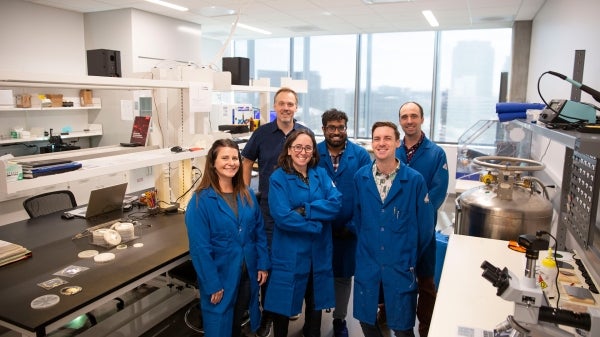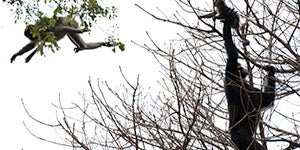How and why did human beings evolve to cooperate with unrelated individuals or even strangers? Consider National Public Radio — donors could listen for free, yet thousands of people donate, collectively supporting a public good.
To understand how this cooperative inclination developed in humans over the last millennia, scientists look to our primate cousins to see if they can observe glimmers of behavior that will help us understand the nature of human collective action. Chimpanzees, together with bonobos, are our closest living relatives, with whom we share at least 96 percent of our genome and a common ancestor that lived some five to seven million years ago.
ASU researcher Ian Gilby has been studying and observing chimpanzees in the wild since 1997. Gilby is an assistant professor in the School of Human Evolution and Social Change and a research affiliate with the Institute of Human Origins. He is also the codirector of the Jane Goodall Institute Research Center database that is the repository of detailed demographic and behavioral data on two communities of chimpanzees collected for over 70 years at Gombe National Park, Tanzania. Using these records and other long-term observational data from the Kibale Chimpanzee Project studying the Kanyawara chimpanzees of Kibale National Park, Uganda, Gilby and colleagues investigated the dynamics of chimpanzee group hunts of red colobus monkeys.
Chimpanzees hunting red colobus monkeys
In this study, which is the first to analyze hunting data from three chimpanzee communities, the researchers found that hunting was more likely to occur if certain key individuals were present when a chimpanzee group encountered red colobus monkeys. They hypothesized that these “impact hunters” catalyzed hunting by being the first to attack, thereby creating opportunities for others to catch prey in the ensuing chaos. Indeed, as predicted, impact hunters were more likely to hunt first than expected by chance, and importantly, affected long-term hunting patterns. At both Gombe and Kanyawara, overall hunting rates decreased after the death or “retirement” of impact hunters.
These results suggest that rather than hunting in a coordinated fashion, these chimpanzees follow an “every chimpanzee for himself” strategy. Hunting in groups is promoted because an individual’s selfish attempts to catch prey incidentally benefit others.
“These results are particularly exciting,” says Gilby, “because they demonstrate the importance of systematic individual differences for understanding the evolution of cooperation. The next step in our research is to investigate the source of this variation.”
"'Impact hunters’ catalyse cooperative hunting in two wild chimpanzee communities," written by Ian C. Gilby (Arizona State University), Zarin P. Machanda (Harvard University), Deus C. Mjungu (The Jane Goodall Institute, Gombe Stream Research Centre), Jeremiah Rosen (Harvard University), Martin N. Muller (University of New Mexico), Anne E. Pusey (Duke University) and Richard W. Wrangham (Harvard University) is published online in the Philosophical Transactions of the Royal Society B.
More Science and technology

ASU professor honored with prestigious award for being a cybersecurity trailblazer
At first, he thought it was a drill.On Sept. 11, 2001, Gail-Joon Ahn sat in a conference room in Fort Meade, Maryland.…

Training stellar students to secure semiconductors
In the wetlands of King’s Bay, Georgia, the sail of a nuclear-powered Trident II Submarine laden with sophisticated computer…

ASU startup Crystal Sonic wins Natcast pitch competition
Crystal Sonic, an Arizona State University startup, won first place and $25,000 at the 2024 Natcast Startup Pitch Competition at…

